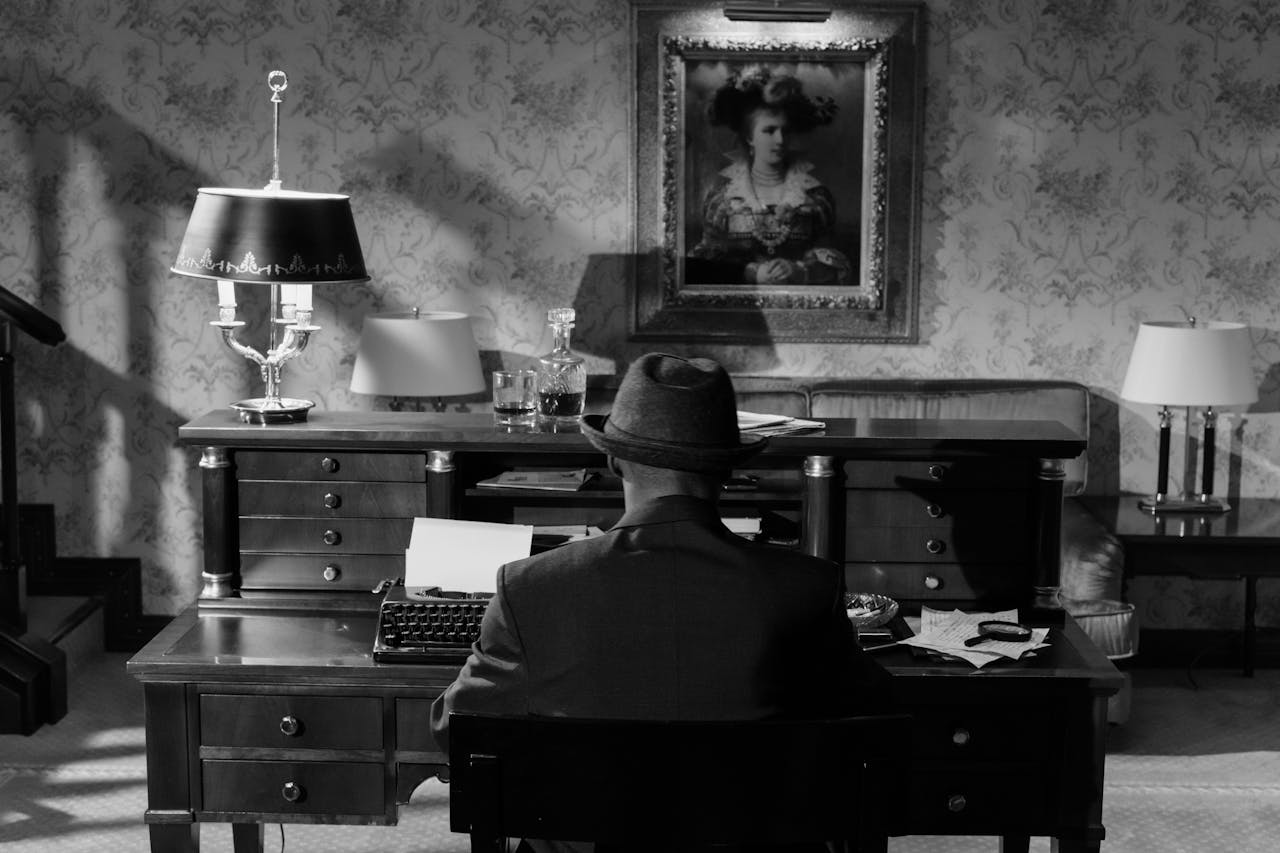INTERIOR, OFFICE – NIGHT
THE DETECTIVE lounges behind his desk. A ceiling fan turns slowly, throwing dramatic and genre-appropriate shadows across the room. THE CLIENT sits across, pleading their (literal) case.
THE CLIENT:
-and that’s why you have to help me, mister! I’ve got no one else to turn to!
THE DETECTIVE (INTERNAL MONOLOGUE, interrupting):
I knew this case was going to be trouble from the start. That’s why I had to make sure I was prepared.
THE DETECTIVE pulls open a drawer on their desk, expecting to pull out their revolver, but hesitates. Instead, they are presented with a magic wand and a ray gun within. A confused beat passes.
THE DETECTIVE, looking straight into the camera:
Is this some sort of joke?
*
But enough about my meta-narrative spec-script that definitely exists outside of a bit setting up the premise of this blog.
The “hardboiled” detective genre has been a staple of thriller and pulp fiction for nigh on a century, and is filled to the brim with evocative, trope-y motifs and themes: an investigator, skilled and dedicated to their work while haunted by past misdeeds, addiction, or just general world-weariness. A damsel-in-distress (or bachelor-in-a-bind) client, at their wit’s end unless the detective can solve the case. A femme fatale (or homme hasardeux), seductive and nefarious, keeping the flawed detective at bay with their wiles (while sometimes being the same person as the client). These tropes instantly bring to mind the smoky, sharp-shadowed rooms of “The Big Sleep,” “The Maltese Falcon,” or “The Postman Always Rings Twice.”
With how codified the hardboiled genre seems to be, with its monolith of crystallized tropes threatening to overshadow any novel developments within its themes, one can easily find that once they’ve read one detective story, they feel like they’ve read them all. Attempts to change the archetypes and tropes can quickly transform a hardboiled noir story into a different genre altogether. Even changing the gender of some of the archetypes above is hard to do, as I had to come up with the masculine versions of damsel-in-distress and femme fatale!
Another route, then, is not to change what makes a hardboiled story, well, hardboiled, but to make other stories hardboiled by adding the genre’s flair to them. The archetypes are so recognizable and so quickly evoke their heritage, that the whole aspect of an otherwise solid genre piece can be altered and, dare I say, enhanced by embracing the tropes. Each of these books from my most recent booklist plays with the archetypes and tropes that epitomize the hardboiled genre by migrating them into fantastical and science fiction settings (to great effect, in my humble opinion).
The Case of the Missing Lunar Daughter: James S.A. Corey’s “Leviathan Wakes”
When an unprovoked attack on an ice-hauling ship on its way back from Saturn leads to an interplanetary cold war threatening to go hot, the worlds of Earth, Mars, and the collective stations and moons of the Belt hang on the precipice of destruction. James Holden and his surviving crew of the ice-hauler Canterbury first blame Mars for the attack, then implicate Earth, leading to a grand story of political intrigue and space-opera action. However, there is a smaller (at first) story: Ceres detective Joe Miller’s case of a missing girl from a wealthy Lunar family, leads him to get entangled with the survivors of the attack, the militaries of Earth and Mars, and a shadowy conspiracy that threatens life as the solar system knows it.
Miller is the prototypical hardboiled detective: gruff, hard-drinking, down-on-his-luck, and unable to get rid of a hunch. He even wears a pork-pie hat to accentuate his man-out-of-time appearance and noir-film demeanor. By all means and measures, Miller should be walking into a speakeasy in downtown Chicago, keeping an eye on the Capone-paid goons while he tails the kidnapper. Instead, he lives on a spinning asteroid station, eating fungi protein and looking for a woman whose family is one of the most powerful in the solar system, and who, through a series of shell companies and mergers, happens to own his security company.
While Miller is very much relegated to side-character status in the latter half of this and later books, I’d argue his investigation and drive to succeed in spite of his own failings are core to this book. Many characters outside the Canterbury crew (and even Miller himself, at one point) consider Holden’s wielding of the scant information he has like a cudgel to be a clumsy and dangerous attitude, and I would have to agree. Without Miller and his deductive skills, this book ends in a much different, and much darker, way. Miller’s detective work, as well as his dedication to his personal code, are what wins the day in the end for our protagonists (or does it…? Read the other 8 books and 9 short stories to find out).
The Case(s) of the Professional Wizard(s): Jim Butler’s “Storm Front” and Ben Aaronovitch’s “Rivers of London”
Harry Dresden is Chicago’s only professional wizard. At least, he’s the only one in the Yellow Pages advertising it. Constable Peter Grant is the first apprentice wizard of Scotland Yard’s Folly in nearly a century, who deals with magical crime within the boroughs of England’s capital. Dresden’s on the trail of a mysterious occult-powered drug that’s sweeping the streets, while Grant goes on a wild hunt for a spirit driving ordinary Londoners to murder, while ameliorating the personifications of the rivers of London. Two wizards, both alike in dignity, but separated by culture, approach to mystery-solving, and that big old body of water in between America and England.
Enter two sides of the same coin: the primetime police procedural of “CSI” and “Broadchurch” fame, and the monster-of-the-week genre serial a la “Supernatural” or “The X-Files.” Both function quite similarly, as they both take an episodic approach to storytelling. Each episode begins with a mystery, a perpetrator, and follows the protagonist(s) in their deductive and mystery solving process. By the end of the episode, the crime is solved, the demon is sealed away, and maybe just a bit of the overarching plot or drama is revealed. Makes for compelling, digestible television; Who doesn’t want to solve a mystery in just under an hour plus ads?
That is the main reason I am (re)reading both of these books. They are fast paced, action packed, and feel like they’re an episode of your favorite show, disregarding the fact that “The Dresden Files” was already made into a (short-lived, ill-reviewed, canned after 12 episodes) television series. And each brings in the archetypes of hardboiled detectives in their own way: Dresden is a hardscrabble, rough-and-tumble, yet intelligent and cunning problem solver, while Grant brings a brash, working-class exuberance in a foil to his mentor’s dour, stiff-upper-lip brooding. If you like a quick, entertaining read which will have you coming back to watch, er, read, your favorite episodes, er chapters, these books are for you.
The Case of the Legal Thieves Guild: Terry Pratchett’s “Guards! Guards!”
The fantasy city of Ankh-Morpork, located in the world of Discworld, a truly flat-earth realm atop the back of 4 elephants (I know) atop the back of a space-swimming sea turtle (this fact is important, I promise), has a City Guard. The City Guards behave like most fantasy city guards, in the “they rush in, die, and run away” sense. Sometimes, they’re even paid to run away before they do the die step! Of course, all of that begins to change with the arrival of idealistic new cadet Carrot Ironfoundersson, who’s strict and idealistic view of the rule of law inspires Watchman Sam Vimes to pursue a novel course for the watch: solving and preventing crime as a conspiracy to take over the city begins to unfold.
The real mystery is how I haven’t read this one yet. I’ve greatly enjoyed other Discworld novels like “The Colour of Magic,” and Pratchett’s other works like “Good Omens,” but I’ve never gotten around to reading any of the City Watch novels from the Discworld series. Off to the stocks with this ill-read criminal! This novel is probably the least hardboiled of the books I’ve surveyed, as Pratchett’s works have always been comedic first and foremost, but elements are still there; jaded crime-solvers attempting to do right in a corrupt system is pretty noir, if you ask me. I’ll get to this book eventually, I’m sure, but for now it remains atop my “You should have read this by now” pile.
If any of these mix-matched genre mysteries and investigators-out-of-time-and-trope intrigue you, be sure to check out the others in my most recent booklist here!




